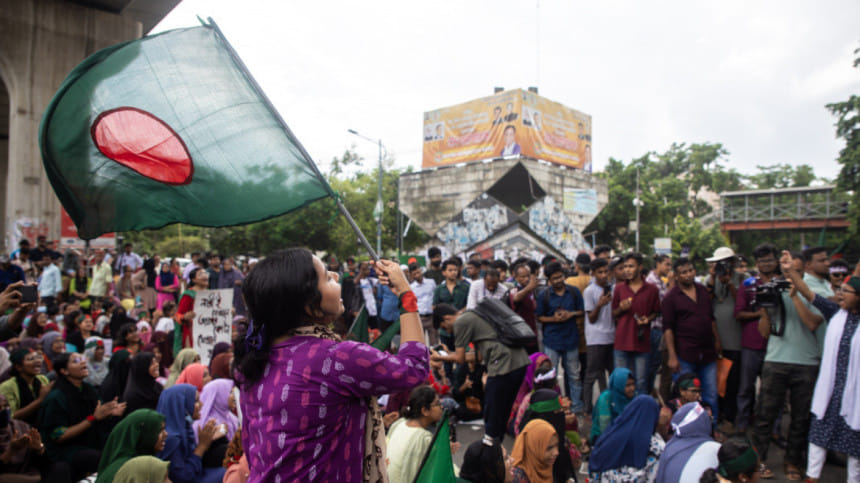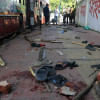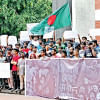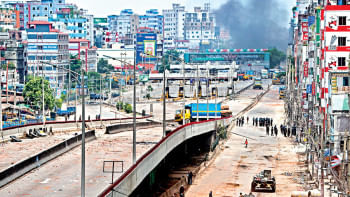The afterlife of an uprising

Certain months linger longer than others, etched not on calendars but in the collective muscle memory of a people. They arrive quietly, but leave behind echoes. For most of us, July 2024 was one of those months. I do not want to talk about July. I do not want to remember it, but July never asks. It arrives like a wound that never quite closes, splitting open with chants, posters, and polished speeches. And every time it does, I feel sick because what July became is not what it was. What it meant to so many of us has been stolen, sold, and politicised beyond recognition. The grief was ours. The horror was real. But the narrative? The narrative is a betrayal.
I remember July came without political banners or party flags. Many of us were not even politically active before July; rather, ordinary people who had finally been pushed to the edge by years of institutional violence and state-sponsored silence. The kind of silence that watches a young boy get picked up at night and never return. The kind that sees students being shot in broad daylight. There was nothing heroic about July. There were just people. People who wanted to live. People who had exams coming up. People who had siblings waiting at home. Some were dreaming about university, some about cricket, some about holding their mother's hand as they crossed the street. And then they were gone. Their lives extinguished, their futures sacrificed—not in the name of some grand ideology, but for the most basic right to live and do so with free will. Now they are called martyrs, and rightly so—their names boxed in slogans and press releases. Now they are branded and labelled depending on who is speaking and what audience they are speaking to. But in July, none of that mattered. In July, they were simply humans. And in refusing to see them that way now, we have not only betrayed them but also betrayed ourselves.
When I think of July, I remember the silence. Not the kind that settles over a nation out of respect, but the kind that suffocates. I remember refreshing my feed over and over again, trying to find some proof that my friends were okay. I remember the sleepless nights, the internet blackout that made everything worse, the anxiety that clenched my chest. I remember feeling like the sky itself had cracked open, spilling fear into every home, every heart. And yet, amid all that, there was something sacred. There was a shared grief, a collective mourning that transcended belief, background, and political alignment. It was the kind of unity that nations spend centuries trying to build. And we felt it, albeit for a brief, heartbreaking moment. We cried together. We raged together. We remembered those faces not as numbers or political pawns, but as people who should have been here. But that unity did not last. They did not survive in a country where grief is currency and memory is up for auction. Within months, the narrative began to shift, and just like that, the sacredness of our grief was desecrated. July was no longer a shared wound but a political territory.
When the government fell, it was not because we had a new leader who inspired the people. It was because the people made it clear they would no longer be ruled by fear. And that moment—chaotic, painful and uncertain—held a kind of purity we had not felt in years. It was not perfect. But it was real. And it felt like, for the first time in generations, Bangladesh might finally be turning a page. And now, that same July is being rewritten. Political parties are back in the driver's seat, speaking in the name of the movement, ready to hijack the grief of a nation to demand elections, as though democracy begins and ends at the ballot box. As though the people did not rise against a system of voting without justice. As though a change in government is all we needed, and not a change in the very way power operates. Violence is once again the language of politics. And fear is creeping back in, disguised as righteous anger.
Kazi Raimul Islam, who lost one of his legs during the July uprising, recently wrote: "Bangladesh is not worthy of sacrifice. The biggest dream of a Bangladeshi should be leaving Bangladesh." Do we understand what it takes for someone who almost died for his country to say that? Do we understand the magnitude of that heartbreak? That is not bitterness. That is someone realising that the country he risked his life for is now being carved up by those who treat suffering as a strategy. We lost so many people. Not just to bullets and batons, but to despair. To burnout. To the unbearable burden of trying to fix something that does not want to be fixed. We failed them. Because we used their miseries, and because we let July become about power, not about people.
Every time I see someone claim July, I feel that old helplessness crawl back in me. And I wonder if they remember the eyes. I remember looking into the eyes of mothers who had just buried their sons. I remember the haunting stillness of faces that had run out of tears. You cannot slogan your way past that. You cannot politicise it without erasing what was real.
My screen time has gone up again. I have been scrolling more, even though there is nothing new to see. I refresh the same two apps. Read the same headlines repackaged. Watch clips of people arguing, protesting, counter-protesting, and screaming. Then I lock my phone, wait five minutes, and do it again. In July, this same habit felt different. Urgent. Purposeful. Every update, every disappearance, every sudden internet blackout—it felt like being a witness to something real, something that might finally shift the weight we have all been carrying in silence for years. But now, I just scroll. Passively. Detached. The things that once made my heart race now barely register. It is not because I stopped caring. It is because what July stood for feels like it is slipping away. It was messy, yes. But it was ours. And now, watching political parties stamp their flags over the memory of it feels wrong.
So no, I no longer want to talk about July. But I must, because silence is what allowed this betrayal to fester. I must talk about it—not in celebration, not in nationalism, not in party loyalty, but in mourning. I must talk about it as someone who lived through it. Not as a tool for someone else's agenda, but as a witness to something we should have held sacred and instead sold off. I am tired of seeing July used as a weapon. I am tired of the narrative being rewritten by the victors while the victims are left behind, forgotten. If we must remember July, let us remember it honestly. Let us remember that it was not a revolution. It was not an uprising. It was a desperate, terrified cry for life. And we turned it into a brand.
Maisha Islam Monamee is a student at the Institute of Business Administration (IBA), University of Dhaka, and a contributor at The Daily Star.
Views expressed in this article are the author's own.
Follow The Daily Star Opinion on Facebook for the latest opinions, commentaries, and analyses by experts and professionals. To contribute your article or letter to The Daily Star Opinion, see our guidelines for submission.

 For all latest news, follow The Daily Star's Google News channel.
For all latest news, follow The Daily Star's Google News channel. 










Comments